Lochhead on Marketing
180 How Important is Framing, Naming, & Claiming a Problem? | Pirates Perspective
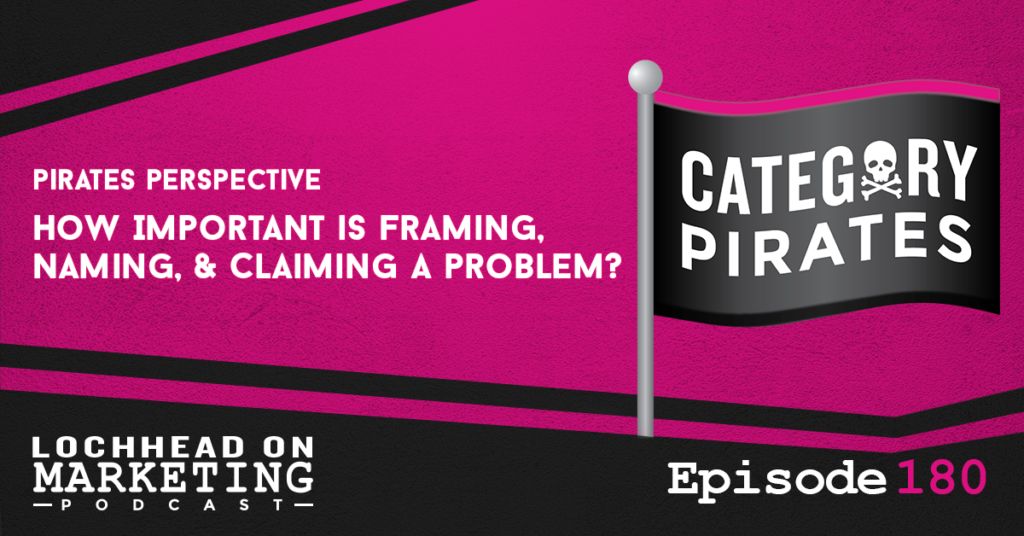
Podcast (lochheadonmarketing): Play in new window | Download (Duration: 11:13 — 7.7MB) | Embed
Subscribe: Apple Podcasts | Spotify | RSS | More
On this episode, we are presenting some Pirates Perspective from our newsletter, Category Pirates.
Eddie Yoon, Christopher Lochhead and Katrina Kirsch of Category Pirates discuss why it’s crucial to frame, name, and claim a problem when designing a category and marketing it to customers. They also discuss why companies struggle to articulate their problems, and explain what happens if they fail to properly language it.
Welcome to Lochhead on Marketing. The number one charting marketing podcast for marketers, category designers, and entrepreneurs with a different mind.
The three most important things a company does at the highest levels
When asked about the problem that category design solves, Christopher emphasizes three key aspects. Firstly, it is important to believe that there are three crucial elements for a successful company: designing a legendary company/business model, offering legendary products/services, and creating a legendary category. These three aspects are considered the most important things a company does. If someone does not agree with this belief, he thinks that there is no basis for further discussion.
Secondly, it is necessary to acknowledge the significance of taking ownership and authorship of the category. If someone is willing to assume this responsibility, then assistance can be provided. However, if they are not interested in this aspect, there is no intention to convince or persuade them.
“That’s the difference between you walking in the dojo and us standing outside the dojo and dragging you into it.”
– Christopher Lochhead
Would you rather capture the 76% or compete for the 24%?
Eddie Yoon emphasizes the importance of category design in capturing the market. He argues that if one does not recognize the significance of category design, then other considerations become irrelevant. If it is agreed that category design is important, it must be acknowledged that it should be pursued wholeheartedly.
Eddie suggests that the question of why naming, framing, and claiming are important is essentially a question about the importance of category design itself. He states that if one does not understand the essence of category design, they cannot effectively address the first question.
He presents a scenario where capturing 76% of the category economics is compared to competing for the remaining 24% with a better or faster, cheaper version. Eddie suggests that many people are actually comfortable with the smaller percentage because it is familiar and known. However, if someone is content with competing for the smaller share, Eddie acknowledges their choice and states that traditional business strategies and teachings will suffice for that situation.
Ultimately, Eddie highlights the importance of understanding one’s preference for a larger or smaller market share and reframing the perspective accordingly.
Unlearning the 24% way
Eddie Yoon discusses the necessity of unlearning old and “comfortable” ways in order to capture the 76% of the market. He emphasizes that choosing to pursue the larger market share requires a significant amount of unlearning.
Part of this unlearning process involves freeing oneself to focus on understanding and articulating the problem at hand. Eddie compares it to Mark Twain’s quote about not having time to write a short letter, which highlights the importance of concise and effective communication. Framing, naming, and claiming the problem are essential because without the ability to express it clearly, important details can be lost in subsequent conversations with coworkers, investors, or customers. This loss of clarity can lead to a diluted understanding of the value proposition.
Eddie explains that without a clear understanding of the problem and its articulation, customers may not perceive the worth or premium of the product or service, investors may question the multiple premiums, and employees may not see the value of choosing the company over competitors focusing on the smaller market share.
Don’t forget to grab a copy (or gift!) of one of our best-selling books:
Snow Leopard: How Legendary Writers Create A Category Of One
The Category Design Toolkit: Beyond Marketing: 15 Frameworks For Creating & Dominating Your Niche
A Marketer’s Guide To Category Design: How To Escape The “Better” Trap, Dam The Demand, And Launch A Lightning Strike Strategy
We hope you enjoyed this episode of Lochhead on Marketing™! Christopher loves hearing from his listeners. Feel free to email him, connect on Facebook, Twitter, Instagram, and subscribe on iTunes!
179 Why Do Some Companies Ship Products And Very Few Category Design Markets? | Pirates Perspective

Podcast (lochheadonmarketing): Play in new window | Download (Duration: 14:34 — 10.0MB) | Embed
Subscribe: Apple Podcasts | Spotify | RSS | More
On this episode, we are presenting some Pirates Perspective from our newsletter, Category Pirates.
Eddie Yoon, Christopher Lochhead and Katrina Kirsch of Category Pirates discuss why some companies ship products, but very few companies category design markets. They explain this through the lens of Apple’s new Vision Pro spatial computing headset in talk about why Apple’s approach is different.
Welcome to Lochhead on Marketing. The number one charting marketing podcast for marketers, category designers, and entrepreneurs with a different mind.
Apple has always been Category First, Product Second
Katrina Kirsch starts off the conversation with how a lot of companies tend to put out products, and not focus on creating a category for them first. Apple seems to be the biggest contrary to this statement, as it has always been a category-driven company rather than product driven.
Eddie Yoon agrees with this, and adds that Apple has never been one to create a product first, or a first-mover. Even going as far as the first Mac, there have been personal computers before it, but Apple sold people to a whole new experience by creating a category around personal computers and having an interface that’s both intuitive and easy to get into.
Copying vs Innovating
Following up to this, there are those who say that Apple is just copying ideas from its competitors and adding their own quirk to it. But if you look at this deeper, Apple is just really good at finding different uses for existing products in the market, something that those who made it first didn’t even consider as a function.
Take for example what Apple is doing to the Vision Pro right now, which was discussed by Christopher in the previous Lochhead on Marketing episode (LOM 178). The main difference with how Google and other virtual headset devices marketed themselves versus the clear-cut presentation and demonstration by Apple is just miles apart. It doesn’t just look like a proof of concept that people can experiment on: Apple clearly tells you, “This is what you can do with it, and what other things you can add on later.”
Apple is attacking the “tyranny of the screen”
Christopher then explains that a lot of people misunderstood Apple’s point of attack in launching the Vision Pro. As product-centric companies and businesses, they think Apple is attacking other products like the Oculus and other VR headsets. When in reality, Apple is aiming for something else.
As Eddie Yoon puts it, Apple is attacking the tyranny of the screen. The concept that we have to get bigger screens when we want better entertainment value, or that we have to be tied down to a certain place when doing work because your display cannot move with you.
The other misconception is that people say Apple did not invent spatial computing. That it has been there this whole time in other products. And that’s true. But they are one of the first to adopt it to a question that only spatial computing can solve, and not just push out a product to see what people will do to it. This gives Apple app developers a range that they can work with; a clear scope and limitation so they don’t overshoot their promises, but at the same time push the boundaries of what can be done with it.
To hear more about these Pirates Perspectives, download and listen to this episode. And if you like to hear more Pirates Perspectives, you can find it and other buried treasures when you subscribe to our Category Pirates newsletter.
Don’t forget to grab a copy (or gift!) of one of our best-selling books:
Snow Leopard: How Legendary Writers Create A Category Of One
The Category Design Toolkit: Beyond Marketing: 15 Frameworks For Creating & Dominating Your Niche
A Marketer’s Guide To Category Design: How To Escape The “Better” Trap, Dam The Demand, And Launch A Lightning Strike Strategy
We hope you enjoyed this episode of Lochhead on Marketing™! Christopher loves hearing from his listeners. Feel free to email him, connect on Facebook, Twitter, Instagram, and subscribe on iTunes!
178 Apple’s New Category Design & Why(almost) No One Got It
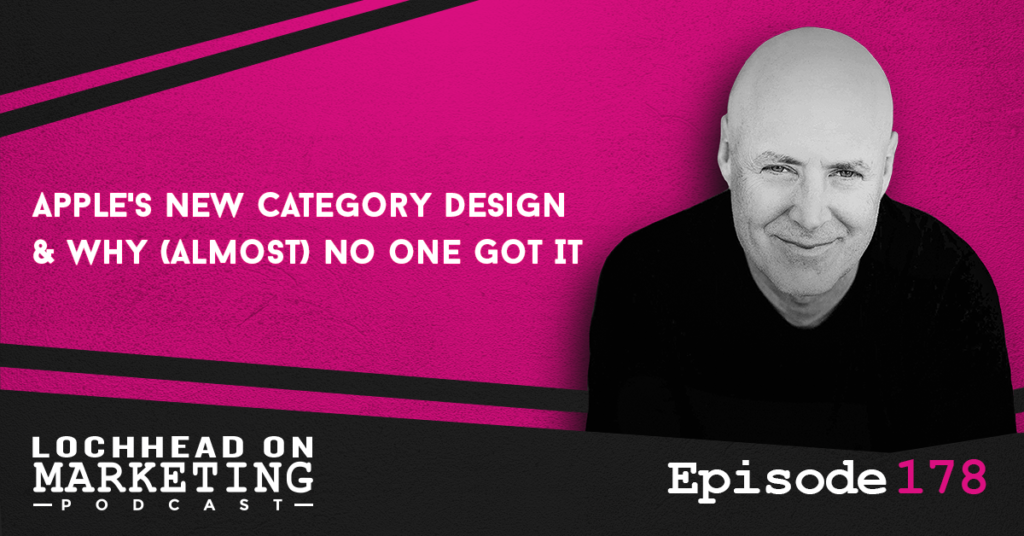
Podcast (lochheadonmarketing): Play in new window | Download (Duration: 8:42 — 6.0MB) | Embed
Subscribe: Apple Podcasts | Spotify | RSS | More
Apple announced some powerful new stuff at their Worldwide Developer Conference. And, as usual, many people in the business press, Twitter, and in Silicon Valley didn’t see what happened in plain sight. So here we are again, explaining why this new category is different from the other virtual and reality augmentation devices out there, and why it is important.
Welcome to Lochhead on Marketing. The number one charting marketing podcast for marketers, category designers, and entrepreneurs with a different mind.
Don’t just launch products, launch categories
Let me put it to you this way. Google launches products, aka Google Glass. Facebook, launches products, aka Oculus. Meanwhile, Apple does Category Design.
It’s fascinating to us that category design hides in plain sight. Because what most people got wrong is they think that Apple introduced a product called Vision Pro. And yes, of course, they did that. But they did not make the same mistake that Google and Facebook made, which is they just launch products; Apple designs categories. And they tell you that’s exactly what they’re doing.
Press Release for Apple Vision Pro
Here’s the headline: introducing Apple Vision Pro, Apple’s first spatial computer.
And what you have is the new product and brand Apple vision Pro. And they tell you what it is. It’s a spatial computer. It’s not a VR/AR headset. It’s not some kind of other variety – It’s a spatial computer. And if you go on to read the press release, what you’ll discover is that Tim Cook’s quote sums the whole thing up. “Today marks the beginning of a new era for computing,” said Tim Cook, Apple’s CEO. Just as the Mac introduced us to personal computing, and iPhone introduced us to mobile computing, Apple Vision Pro introduces us to spatial computing. And that, my friends, is the difference between marketing a category and just a product.
Creating a new computing platform
And this is what most people miss. And the reason they did it at their worldwide developer conference, is because they want the vision pro spatial computer to become a new compute platform. Just like the iPhone became a new compute platform, the personal computer became a new compute platform. That’s what they’re doing here. The iPad, etc. became a new platform, a new category of technology, not just a product that they gave to people.
Launching a product without a category is like a loose cannon
When Google launched Google Glass, they launched a product, they never articulated a problem that that product solved. They never evangelized a different future with that product. What they did was show a bunch of features. And because they didn’t provide the strategic context for understanding of what the product was, aka category, they left it up to customers and the media to decide.
Well, what happened? If you don’t control your own category narrative, somebody else will. And so what emerged about Google Glass? Well, number one, because they did the launch in Silicon Valley, the people who used it immediately got the nickname of “glass-holes”, because it was rich assholes using Google Glass and beta and early release driving around in their Tesla’s and the like, that sort of drew the ire of much of the world.
To hear more on what Apple did right with the launch of their new category, download and listen to this episode.
Bio
Christopher Lochhead is a #1 Apple podcaster and #1 Amazon bestselling co-author of books: Niche Down and Play Bigger.
He has been an advisor to over 50 venture-backed startups; a former three-time Silicon Valley public company CMO and an entrepreneur.
Furthermore, he has been called “one of the best minds in marketing” by The Marketing Journal, a “Human Exclamation Point” by Fast Company, a “quasar” by NBA legend Bill Walton and “off-putting to some” by The Economist.
In addition, he served as a chief marketing officer of software juggernaut Mercury Interactive. Hewlett-Packard acquired the company in 2006, for $4.5 billion.
He also co-founded the marketing consulting firm LOCHHEAD; the founding CMO of Internet consulting firm Scient, and served as head of marketing at the CRM software firm Vantive.
Don’t forget to grab a copy (or gift!) of one of our best-selling books:
Snow Leopard: How Legendary Writers Create A Category Of One
The Category Design Toolkit: Beyond Marketing: 15 Frameworks For Creating & Dominating Your Niche
A Marketer’s Guide To Category Design: How To Escape The “Better” Trap, Dam The Demand, And Launch A Lightning Strike Strategy
We hope you enjoyed this episode of Lochhead on Marketing™! Christopher loves hearing from his listeners. Feel free to email him, connect on Facebook, Twitter, Instagram, and subscribe on iTunes!
177 Should My Category Name Be Relevant And Relatable? | Pirates Perspective
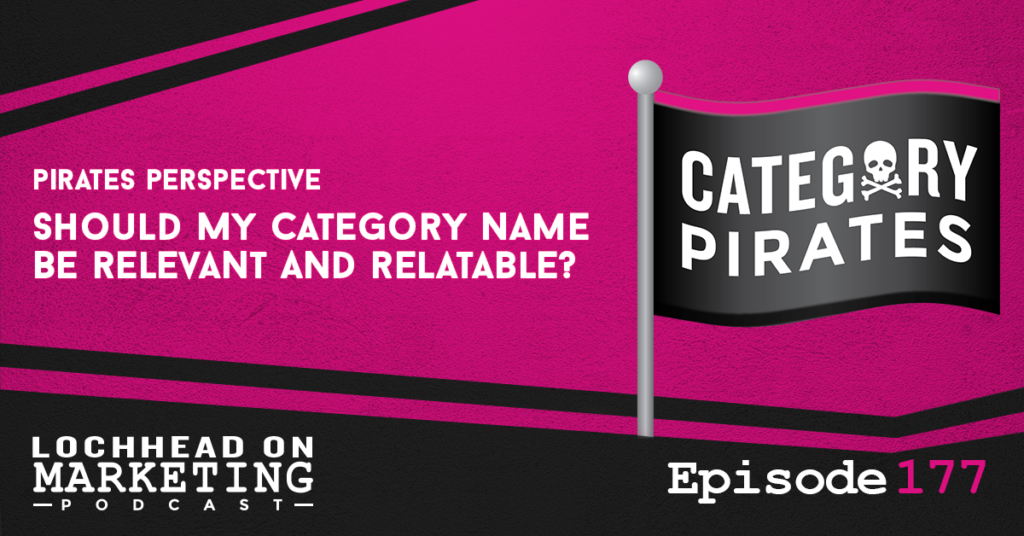
Podcast (lochheadonmarketing): Play in new window | Download (Duration: 9:40 — 6.6MB) | Embed
Subscribe: Apple Podcasts | Spotify | RSS | More
On this episode, we are presenting some Pirates Perspective from our newsletter, Category Pirates.
Eddie Yoon and Christopher Lochhead of Category Pirates answer questions about how important it is to create a category name that resonates with people—and that is similar enough to everyday language. Languaging takes thinking, but it’s worth getting right.
Welcome to Lochhead on Marketing. The number one charting marketing podcast for marketers, category designers, and entrepreneurs with a different mind.
The importance of a Category Name entering the mainstream
The first topic comes from a question about the importance of having a category name, and how important it is to be relevant enough to be used in everyday speech and lingo.
Eddie points out that it is every important and a great deal to have one’s category name be something recognized by the public, particularly the target consumers, while striking a balance of being unique and different from the rest.
An example he gives is Starbucks, which is in the “Dessert Coffee” business. While they might not outright say that they are in such as business, how they portray their products is perceived by consumers as such. And they capture that particular market by Languaging, creating something new like the Frappuccino.
Having your Category Name make a mark in people’s minds
Continuing along that line of thought, Eddie Yoon emphasizes that it is not only important to create something new, but it is also important that people find it relevant and want to engage with your product or service.
Going to the example of Starbucks again, people have had coffee before, but they have not had dessert coffee. And say what you will, Frappuccino is essential a liquid sugar bomb in a cup, which a lot of people find more interesting than your regular latte or cappuccino.
And where can you buy this Frappuccino? That’s right, Starbucks.
Nowadays, there are numerous coffee shops that use the term, but whenever one thinks of Frappuccino, Starbucks is one of the first things that come to mind. And that is how you make a mark in people’s minds.
Combining Ideas to make a new innovative Category Idea
Christopher Lochhead then brings up the topic of combining two or three ideas to make a new Category Idea. Sometimes, those ideas can even clash with each other individual, but makes sense when you combine them.
An example of this was Sun Microsystems, which went all-in for networking earlier than everyone else. While people are still using their computers as standalone units in business, Sun Microsystems have been selling servers and advocated for business to build a network for their office PCs. They even have their own networking software called Solaris.
So while the business people in the 90’s finally had their delayed A-ha! moment, Sun Microsystems have already carved up a sizable chunk of the market for themselves.
To hear more about these Pirates Perspectives, download and listen to this episode. And if you like to hear more Pirates Perspectives, you can find it and other buried treasures when you subscribe to our Category Pirates newsletter.
Don’t forget to grab a copy (or gift!) of one of our best-selling books:
Snow Leopard: How Legendary Writers Create A Category Of One
The Category Design Toolkit: Beyond Marketing: 15 Frameworks For Creating & Dominating Your Niche
A Marketer’s Guide To Category Design: How To Escape The “Better” Trap, Dam The Demand, And Launch A Lightning Strike Strategy
We hope you enjoyed this episode of Lochhead on Marketing™! Christopher loves hearing from his listeners. Feel free to email him, connect on Facebook, Twitter, Instagram, and subscribe on iTunes!
176 How AI Changes Startups, Entrepreneurship & Venture Capital with Mike Maples Jr. of Floodgate
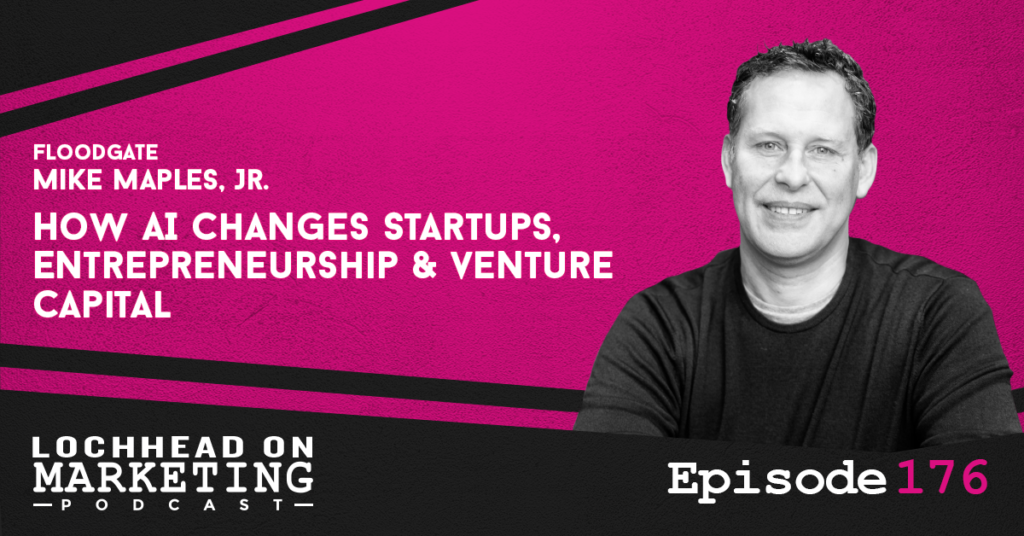
Podcast (lochheadonmarketing): Play in new window | Download (Duration: 39:09 — 26.9MB) | Embed
Subscribe: Apple Podcasts | Spotify | RSS | More
On this episode of Lochhead on Marketing, we have a dialogue with Mike Maples Jr. on how artificial intelligence is changing startups and venture capital.
Mike Maples Jr. is the co-founder of Floodgate, one of the highest profile early stage venture capitalists. He also has a podcast called Starting Greatness, and it is one of my absolute favorites.
By the end of it, we hope that you’ll gain a new way to think about both technical risk for startups and market risk. And why in an AI world, you must either be radically different or radically disintermediate something.
Welcome to Lochhead on Marketing. The number one charting marketing podcast for marketers, category designers, and entrepreneurs with a different mind.
Mike Maples Jr. on AI
We begin the discussion on the topic of challenges of making sense of the rapidly evolving field of AI.
Mike also talks about the traditional funding model of startups, where the primary focus was taking out technical risk, and how the LAMP stack, which commoditized what was once expensive, made it easier to start a startup. Mike notes that the nature of the LAMP stack changed what startups were funded for.
“What I like to say is that the LAMP stack was deflationary in terms of the cost of starting startup. And so what does that mean? It meant that what you were funding was different, because if Kevin Rose can start dig for $1,500, over a weekend, there’s no technical risks there. I mean, he hired a contractor to do it that he didn’t even know at the time.”
– Mike Maples Jr.
Who gets Product Market Fit first
The conversation then moves on to the changing dynamics of venture capital investment. The discussion continues with the notion that technical risk and market risk are inversely related. Solving a technically difficult problem that is valuable to society will create a market; if the problem is easy to solve technically, it will all come down to who achieves product-market fit first.
To add value to the business, Floodgate and YC have taken the approach of funding market risk takedown. As technology becomes more commoditized and innovations become more accessible, the person who creates something people want the quickest wins. This is why YC was so successful: it offered young people $100,000 to either take market risks or leave.
He also mentions that the traditional venture capital model may not be appropriate for all businesses and that deflationary factors such as content, code, and data may change the way businesses are built.
Mike Maples Jr. on AI and the future of Venture Capital
Mike Maples Jr. then returns to the topic of artificial intelligence and its implications for the future of venture capital.
Here, Mike emphasizes two ends of the risk spectrum: high technical risk and high market risk. On the one hand, some projects require large amounts of funding for mass computation in order to build massive models that have the potential to change humanity. On the other hand, AI is being used in a variety of fields, including content generation for marketing, customer service chatbots, and lead generation, resulting in a deflationary effect on content, code, and data.
According to Mike, some businesses may not require traditional venture capital funding and should instead focus on achieving $50 million in revenue with a small team and minimal funding. There is also speculation that the current billion-dollar funds may be providing the wrong incentives to these companies.
To hear more from Mike Maples Jr. and how AI can affect the future of startups and venture capital, download and listen to this episode.
Bio
Mike Maples Jr. is an entrepreneur turned venture capitalist.
He’s co-founder of Silicon Valley based, early-stage VC Floodgate. And the host of the popular “Starting Greatness” podcast.
Investments include Twitter, Lyft, Bazaarvoice, Sparefoot, Ayasdi, Xamarin, Doubledutch, Twitch.tv, Playdom, Chegg, Demandforce, Rappi, Smule, and Outreach.
Link
Connect with Mike Maples Jr.!
Floodgate | Twitter | LinkedIn | Starting Greatness Podcast
We hope you enjoyed this episode of Lochhead on Marketing™! Christopher loves hearing from his listeners. Feel free to email him, connect on Facebook, Twitter, Instagram, and subscribe on iTunes!
175 Elon Musk’s New Category Design For Twitter: Will it work?
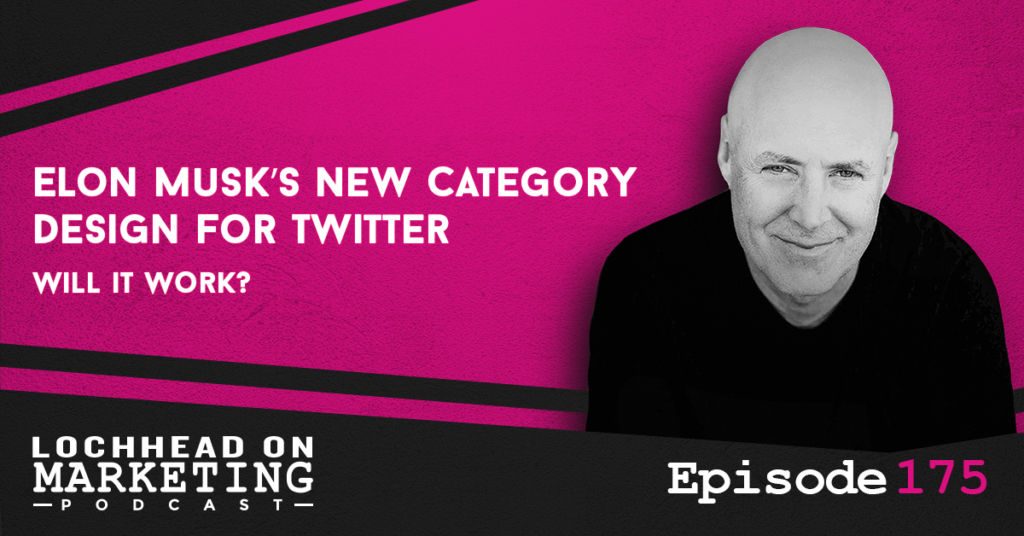
Podcast (lochheadonmarketing): Play in new window | Download (Duration: 15:47 — 10.8MB) | Embed
Subscribe: Apple Podcasts | Spotify | RSS | More
On this episode of Lochhead on Marketing, myself and Eddie Yun, co-founder & co-creator of Category Pirates, tackle what’s going on with what Elon Musk is now doing at Twitter; specifically, the move to charging people for their Validation Verification– once coveted, now purchasable – Blue Checkmarks.
This is part of a new thing we’re doing with our Category Pirates newsletter called Pirate Perspectives. So if you are interested and haven’t subscribed to Category Pirates yet, now’s the best time to check it out.
Welcome to Lochhead on Marketing. The number one charting marketing podcast for marketers, category designers, and entrepreneurs with a different mind.
Twitter removes the Blue Check. Kinda.
The conversation starts with Christopher and Eddie Yoon discussing Twitter’s recent decision to remove Legacy Blue Checkmarks and only allowing verified accounts for those who pay. Eddie argues that this move is a step towards aligning Twitter’s incentives with its users by making them pay for the service rather than monetizing their data through an advertising model. However, he suggests that Twitter could offer a tiered pricing structure to accommodate different budgets.
The two acknowledge that this move has caused a lot of controversy, with some users upset about losing their Legacy Blue checkmarks, while some are given Blue checkmarks even though they didn’t ask for one. Christopher mentions that Elon Musk paid for verified accounts for Stephen King, LeBron James, and others, and they are angry about the change given their prior stance about it.
Elon Musk and the missed opportunity with repurposing the blue checkmark
Christopher and Eddie then talk about the recent decision by Twitter to remove the blue checkmark verification for some users. Christopher mentions that he appreciates the verification process before because it helps him identify real people on the platform.
They also discuss the success of OpenAI’s GPT chat and the importance of delivering a valuable user experience. Eddie agrees and mentions that incentivizing creators can improve the overall ecosystem by improving content and reducing fraud. They agree that Elon Musk and Twitter missed an opportunity to position the repurposing of blue checkmarks as an improvement to the user experience rather than a takeaway.
To hear more about these category pirates’ hot takes on what is happening to Twitter and the social media space, download and listen to this episode.
Bio
Christopher Lochhead is a #1 Apple podcaster and #1 Amazon bestselling co-author of books: Niche Down and Play Bigger.
He has been an advisor to over 50 venture-backed startups; a former three-time Silicon Valley public company CMO and an entrepreneur.
Furthermore, he has been called “one of the best minds in marketing” by The Marketing Journal, a “Human Exclamation Point” by Fast Company, a “quasar” by NBA legend Bill Walton and “off-putting to some” by The Economist.
In addition, he served as a chief marketing officer of software juggernaut Mercury Interactive. Hewlett-Packard acquired the company in 2006, for $4.5 billion.
He also co-founded the marketing consulting firm LOCHHEAD; the founding CMO of Internet consulting firm Scient, and served as head of marketing at the CRM software firm Vantive.
Don’t forget to grab a copy (or gift!) of one of our best-selling books:
Snow Leopard: How Legendary Writers Create A Category Of One
The Category Design Toolkit: Beyond Marketing: 15 Frameworks For Creating & Dominating Your Niche
A Marketer’s Guide To Category Design: How To Escape The “Better” Trap, Dam The Demand, And Launch A Lightning Strike Strategy
We hope you enjoyed this episode of Lochhead on Marketing™! Christopher loves hearing from his listeners. Feel free to email him, connect on Facebook, Twitter, Instagram, and subscribe on iTunes!
174 CFO To CMO (tough times) Conversation
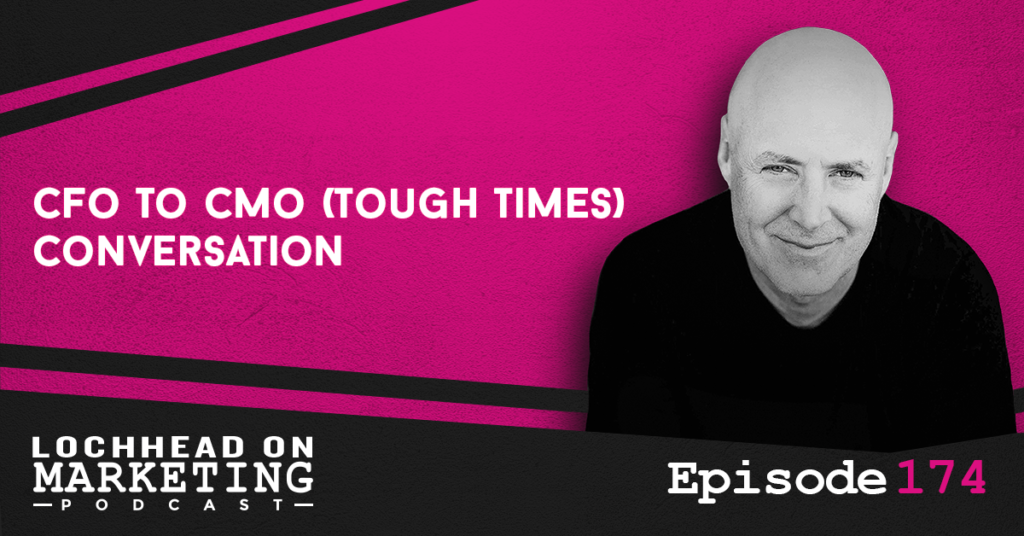
Podcast (lochheadonmarketing): Play in new window | Download (Duration: 2:38 — 1.8MB) | Embed
Subscribe: Apple Podcasts | Spotify | RSS | More
This Lochhead on Marketing episode is a short one, almost like a bedtime story with Uncle Lochhead.
I recently did a post on LinkedIn that blew up in a way that I didn’t quite expect. It was meant to be a humorous post about Marketing, but it seems to have cut quite deep in some, and others found it relatable. I thought it would be fun to read to you so we could share a few chuckles about it.
Welcome to Lochhead on Marketing. The number one charting marketing podcast for marketers, category designers, and entrepreneurs with a different mind.
The Conversation
CFO to CMO: “Our revenue is going down, so we must cut your marketing budget”
CMO: “I’m confused, Marketing is how we drive revenue?”
CFO: “The macro environment is tough and we need to cut costs.”
CMO: “But, Marketing is how we drive revenue?”
CFO: “Yes, but Marketing is the fastest and easiest way to cut costs!”
CMO: “But, if we need revenue, don’t we need Marketing more than ever?”
CFO: “Not sure what they’re teaching today at Marketing MBA school, but we’re cutting your Marketing budget 30%.”
CMO: “OK, so when revenue goes down, the best strategy is cut Marketing?”
CFO: “YES! I believe you’ve got it!”
To check out how people reacted and responded to this “conversation”, check out the post on LinkedIn.
If you like this and are interested in joining different business and marketing conversations, join us at Category Pirates today!
Bio
Christopher Lochhead is a #1 Apple podcaster and #1 Amazon bestselling co-author of books: Niche Down and Play Bigger.
He has been an advisor to over 50 venture-backed startups; a former three-time Silicon Valley public company CMO and an entrepreneur.
Furthermore, he has been called “one of the best minds in marketing” by The Marketing Journal, a “Human Exclamation Point” by Fast Company, a “quasar” by NBA legend Bill Walton and “off-putting to some” by The Economist.
In addition, he served as a chief marketing officer of software juggernaut Mercury Interactive. Hewlett-Packard acquired the company in 2006, for $4.5 billion.
He also co-founded the marketing consulting firm LOCHHEAD; the founding CMO of Internet consulting firm Scient, and served as head of marketing at the CRM software firm Vantive.
We hope you enjoyed this episode of Lochhead on Marketing™! Christopher loves hearing from his listeners. Feel free to email him, connect on Facebook, Twitter, Instagram, and subscribe on iTunes!
173 Untold lessons from the SVB bank run | Christopher Lochhead on Starting Greatness with Mike Maples Jr.
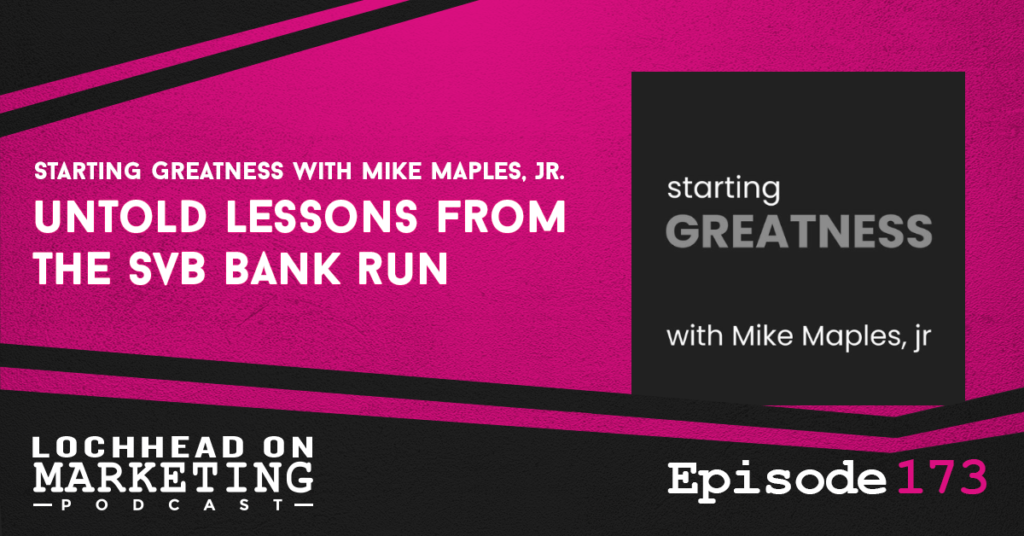
Podcast (lochheadonmarketing): Play in new window | Download (Duration: 34:24 — 23.6MB) | Embed
Subscribe: Apple Podcasts | Spotify | RSS | More
Pirate Lochhead is sailing the seven seas this week, so we’re dropping a legendary conversation that he had recently with Mike Maples Jr. and Ann Miura on the Starting Greatness Podcast.
They discuss the recent SVB bank run that lead to a variety of situations and accusations by “experts” on social media. They also discuss what lessons a Founder can learn by studying the cause and effect of such crisis and circumstances.
Welcome to Lochhead on Marketing. The number one charting marketing podcast for marketers, category designers, and entrepreneurs with a different mind.
How a crisis can make us better
Mike opens up the discussion by stating that while crisis is something we do not wish to happen on anyone, it can be a valuable source of information and introspection on what Founders can improve upon within their own companies and organizations.
No one saw it coming
Ann Miura shares that the SVB bank run has caught her completely unawares, as did most of the companies in Silicon Valley. Even those who had their teams monitoring SVB activities only caught wind of the situation a day or two before it happened, and by then it was already too late even for them.
The Difference between the Public and the Founders
Ann also observed that while people on social media and the news media are shouting doomsday scenarios and blaming each other over the situation, the Founders that she was working with at Floodgate had their head down and was busy finding ways to mitigate the situation, and looking at possible scenarios to move forward, should the SVB run not get resolved in the near future.
It showed a stark contrast on how the mind of a Founder operates in crisis situations, and it should be something that a lot of business leaders should emulate if they themselves suffer through a sudden situation that needed their immediate focus and levelheadedness.
To hear more from Mike Maples Jr. Ann Miura, and the Pirate Lochhead himself, download and listen to this episode.
Check out more Starting Greatness episodes!
Bio
Christopher Lochhead is a #1 Apple podcaster and #1 Amazon bestselling co-author of books: Niche Down and Play Bigger.
He has been an advisor to over 50 venture-backed startups; a former three-time Silicon Valley public company CMO and an entrepreneur.
Furthermore, he has been called “one of the best minds in marketing” by The Marketing Journal, a “Human Exclamation Point” by Fast Company, a “quasar” by NBA legend Bill Walton and “off-putting to some” by The Economist.
In addition, he served as a chief marketing officer of software juggernaut Mercury Interactive. Hewlett-Packard acquired the company in 2006, for $4.5 billion.
He also co-founded the marketing consulting firm LOCHHEAD; the founding CMO of Internet consulting firm Scient, and served as head of marketing at the CRM software firm Vantive.
We hope you enjoyed this episode of Lochhead on Marketing™! Christopher loves hearing from his listeners. Feel free to email him, connect on Facebook, Twitter, Instagram, and subscribe on iTunes!
172 The New Way To Create Content & Code
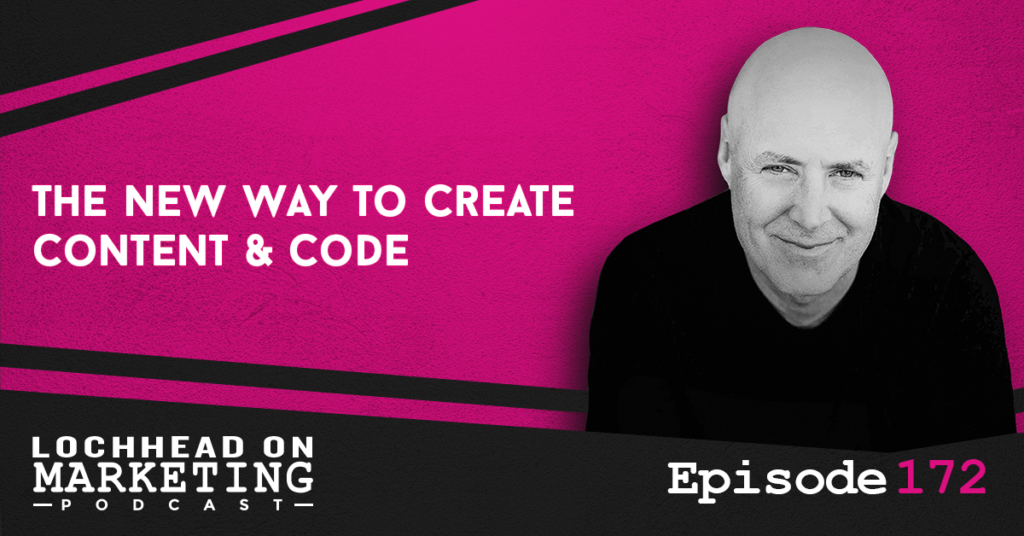
Podcast (lochheadonmarketing): Play in new window | Download (Duration: 19:36 — 13.5MB) | Embed
Subscribe: Apple Podcasts | Spotify | RSS | More
There is a fundamental tectonic change happening in the way work gets done – White Collar knowledge work to be specific.
This new technology is creating a new category of worker beyond what has been the sort of top of the pyramid, the Knowledge Workers. There’s a new layer above the Knowledge Worker emerging called the Creator Capitalist – someone who gets paid not simply to apply knowledge, but to create it. And that’s because the value of existing knowledge is dropping exponentially every day with the emergence of AI.
Today, let’s talk about how this is already becoming a radically different future right in front of our eyes, powered by chatGPT.
What is ChatGPT?
ChatGPT is the fastest growing application or website in the history of humanity by quite a lot. And while there are users that only see it as a minor amusement at the moment, people have been heavily using it for their jobs and businesses already. There are entrepreneurs, writers and other related enterprises that use it to write newsletters, blog posts, and even outlines for book ideas.
Of course, you don’t just put it the prompt and take the ChatGPT output as it is. While it is doing a pretty good job, even with niche-y things, there’s still room for improvement, as well as giving it the old human touch. But the biggest thing here is, it saves people time. Time that could be better spent on improving other aspects of your business.
How ChatGPT can innovate your craft
In terms of creating content, whether it be an blog article, newsletter, or marketing content, there is so many ways you can take advantage of this technology.
As mentioned earlier, you can use it to write first drafts to flesh out an idea you have and refine it afterwards to make it more unique and correct stuff that seem off-point to what you had in mind. You can also use in something as simple as improving the readability and format of the thing you’ve already written beforehand.
You can even use ChatGPT to learn new things before creating your content by providing it with sources and different templates on which to base the content you intend to create later.
The AI is as smart as you make it to be
While the AI has a lot of capabilities that it can do, it all still boils down to how we use it. An example would be the prompts that we give ChatGPT to execute. Being too vague or general with your prompts can yield confusing and subpar results, as multiple users have observed. So it is best to do some research from prompt engineers on how to maximize the results of your requests to the AI, so you’ll get the best quality of content or feedback all the time.
To learn more on how you can use ChatGPT and other AI technology to create content and code, download and listen to this episode.
Bio
Christopher Lochhead is a #1 Apple podcaster and #1 Amazon bestselling co-author of books: Niche Down and Play Bigger.
He has been an advisor to over 50 venture-backed startups; a former three-time Silicon Valley public company CMO and an entrepreneur.
Furthermore, he has been called “one of the best minds in marketing” by The Marketing Journal, a “Human Exclamation Point” by Fast Company, a “quasar” by NBA legend Bill Walton and “off-putting to some” by The Economist.
In addition, he served as a chief marketing officer of software juggernaut Mercury Interactive. Hewlett-Packard acquired the company in 2006, for $4.5 billion.
He also co-founded the marketing consulting firm LOCHHEAD; the founding CMO of Internet consulting firm Scient, and served as head of marketing at the CRM software firm Vantive.
Don’t forget to grab a copy (or gift!) of one of our best-selling books:
Snow Leopard: How Legendary Writers Create A Category Of One
The Category Design Toolkit: Beyond Marketing: 15 Frameworks For Creating & Dominating Your Niche
A Marketer’s Guide To Category Design: How To Escape The “Better” Trap, Dam The Demand, And Launch A Lightning Strike Strategy
We hope you enjoyed this episode of Lochhead on Marketing™! Christopher loves hearing from his listeners. Feel free to email him, connect on Facebook, Twitter, Instagram, and subscribe on iTunes!

